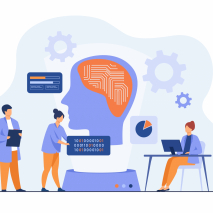Give a man a fish and feed him for a day. Teach a man to fish and feed him for a lifetime.
Generations have used this to describe the value of applying data and knowledge to achieve strategic goals. But it’s a message that hasn’t always got through to professionals who focus upon making money and taking decisions as quickly as possible.
Before you jump to conclusions about greedy businessmen or irresponsible casino-bankers, the group I’m talking about occupy the opposite end of the ethical spectrum. NGOs and charities are perhaps the most restlessly focused on the practice of raising money, matched only by the urgency in which they strive to achieve their ends and change lives for the better.
Because data is a great opportunity for NGOs. Harnessing it enables them to realise their full potential and maximise available resources with the least possible waste.
More to the point, failing to do so could spell their end.
WeSeeHope is a charity helping tens of thousands of vulnerable young people in Southern and Eastern Africa through a variety of innovative schemes including micro-investment programmes for local business ventures that, in turn, increase the quality of life for children living in extreme poverty. By using data-driven analysis, WeSeeHope has been able to pinpoint improvements and identify the kinds of investments that work the best. It has also been better able to evaluate the impact of its work on children, not just the value of the wealth-creating business venture. These insights in turn enable WeSeeHope’s fundraising team to communicate more substantial feedback to donors, and encourage further giving.
While this NGO is succeeding with its data-driven initiatives, many are still finding it difficult to create the change they want.
A third of charities and NGOs are powerless to do anything with their data, even though they know how valuable it is
EveryAction’s 2016 report into the relationship between NGOs and their data found that the scale of this challenge cannot be overstated. The research found that, of the 460 NGO professionals asked, 90% were collecting data but 31% didn’t know what to do with it. Only 5% said that important decisions were always driven by data insights.
Lack of time and personnel emerged as the biggest constraints, with almost two-thirds of respondents reporting a lack of any internal resource dedicated to the job of data management.
Lack of time can be extremely problematic for crisis-orientated NGOs that attempt to stretch finite resources to respond to urgent needs around the world.
One of these is US-based Direct Relief, which provides emergency medical supplies into more than 70 countries. Natural disasters and disease outbreaks are unpredictable which means Direct Relief has to be able to monitor the medical supply donations they receive, and where they are held and sent, in real time.
This requires no small measure of back-office data analytics, combined with a visual interface that allows managers to make quick, informed decisions on a global scale. Generated in the form of interactive maps, these data insights are also published to enable Direct Relief donors to proactively dispatch additional drugs in line with fast-changing requirements and priorities. This minimises life-threatening delays and the wastage of time-expired pharmaceuticals.
Another key finding in the EveryAction study was the disparity between the perceived strategic importance of data, and the confidence in being able to maximise its usefulness. 87% agreed that data was at least moderately important to the operations of their organisation, compared to just 6% who said that the data at their disposal was used effectively.
Don’t forget to equip your fundraising efforts for a data-driven assault
Essential to the operations of every NGO is of course a slick and effective fundraising capability, and this core function is another that data has been harnessed to exploit.
The Akshaya Patra Foundation in India feeds over 140,000 children every day with a free midday lunch that neither their school nor their family can afford to provide. Costs for this growing need don’t just involve sourcing ingredients and running kitchens, but also operating a complex transportation infrastructure across towns and cities in 10 states – a challenge that data insights have helped to make significantly more efficient.
But it’s the Akshaya Patra fundraising efforts that have arguably reaped the biggest rewards from data analytics, by examining the relative costs of raising funds through different means. This exercise showed how possible it was to raise significantly greater sums through the cheapest modes of fundraising – namely Internet and the telephone. As a result, in just two years, these cheaper forms of fundraising account for more than four times the overall proportion of monies raised as before.
Returning once more to the survey of NGO professionals and their attitudes toward data, it says a lot that only 30% of the sample interviewed were happy to recommend their existing software platform. That’s because in this brave new world of data-driven insights and data-driven business models, the term ‘data-driven’ is just another moniker for ‘software’. NGOs can’t afford to get their software wrong, and neither can the aims they serve.
The role data – and therefore software – plays in today’s digital world is abundantly clear. Data is a commodity to be extracted and refined. Businesses know it, even cybercriminals know it. So too, do NGOs, non-profits and charities.

